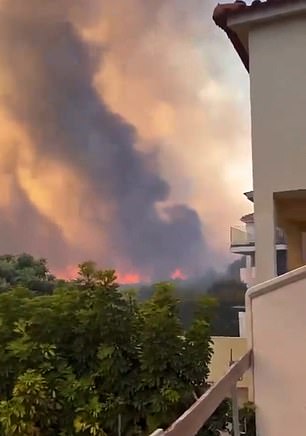Wildfires have ravaged a popular coastal area of Portugal as torrential rains and flash floods have swept across much of Europe, as the continent continues to be ravaged by extreme weather this summer.
In recent days, flash floods have swept away cars in parts of France and the Netherlands, streets have turned into rivers and people have been trapped in their homes and even hospitalised.
Severe storms have claimed lives in the mountains of Germany and Austria, where two young hikers, aged 18 and 22, died in separate incidents after being struck by lightning. Warnings have been issued that more storms are expected today.
But it’s a different story in Cascais, a beloved area for Britons holidaying near the Portuguese capital Lisbon, where dry and windy conditions allowed a “large” wildfire to break out yesterday, with dramatic images showing it spreading close to holiday homes and apartments.
Meanwhile in Greece, dramatic images show fires raging through forests in several parts of the country, burning non-stop for days after being started by lightning and fanned by strong winds.
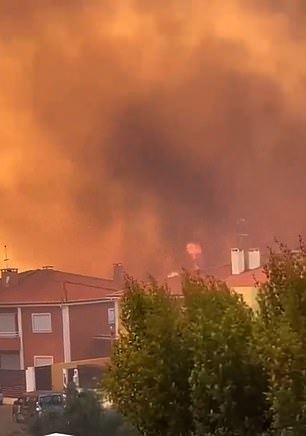
PORTUGAL: Dramatic video shows large forest fires near homes in Alcabideche, Cascais
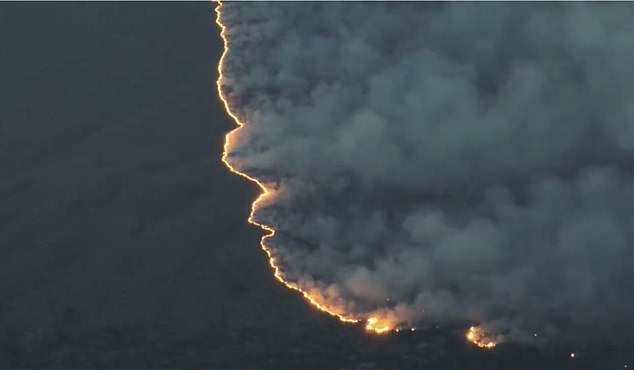
GREECE: In the mountainous area north of Falakro, a wall of flames has been burning grasslands for five days.
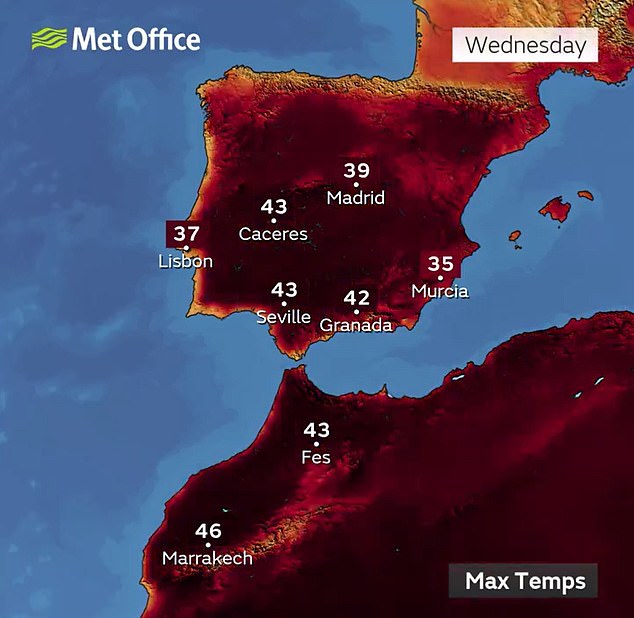
British families heading to Spain, Portugal and Morocco for summer holidays this week have been warned to prepare for a heatwave with temperatures reaching as high as 46C.
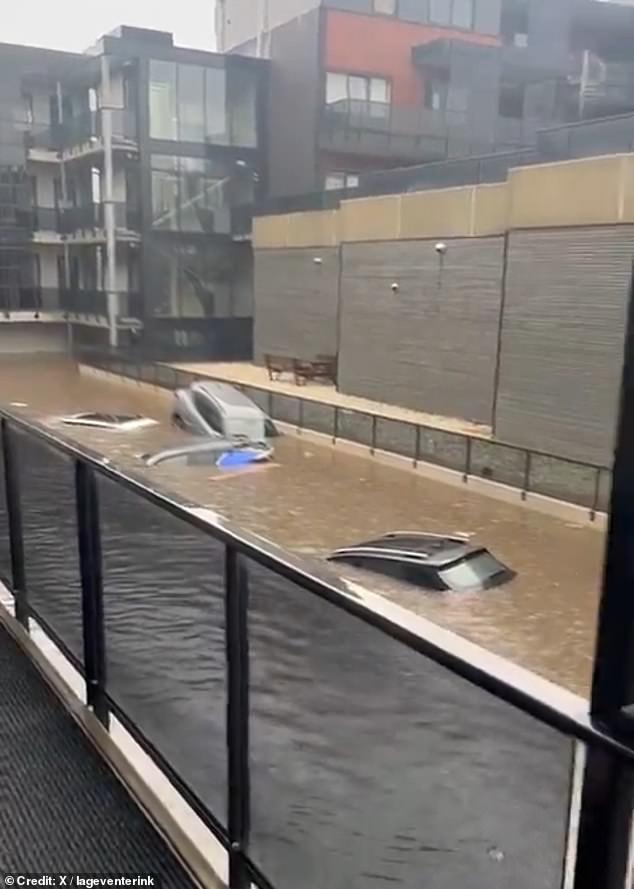
NETHERLANDS: Floodwaters have caused flooding of vehicles and trapped people in their homes in the city of Enschede
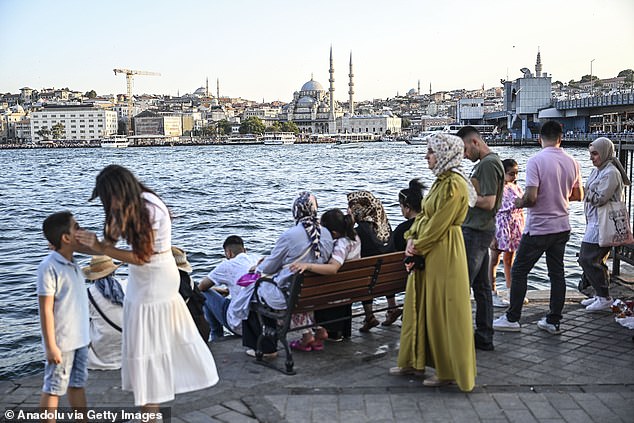
Türkiye: People try to cool off by the water amid high temperatures in Istanbul
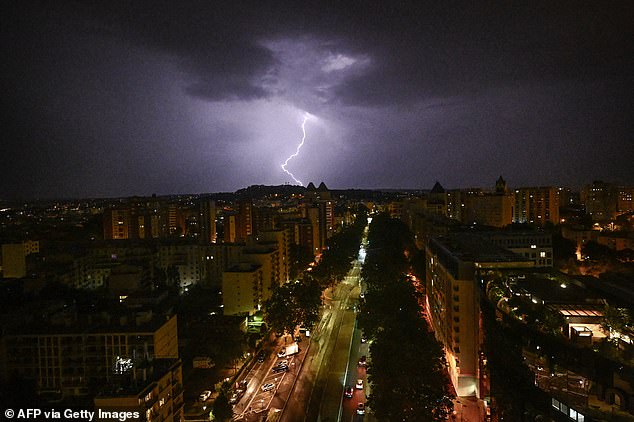
FRANCE: Lightning is seen over a district of Paris amid thunderstorms in France ahead of the start of the Olympic Games in the French capital.
In the mountainous area north of Falakro, a wall of flames has been burning grasslands for five days straight after lightning set two areas ablaze, which then merged into a single large front.
The fire is spreading rapidly due to strong winds, Protothem Fire service helicopters are reportedly continuing to battle the blaze with water drops amid fears it could spread out of control into residential areas.
A scorching heatwave sent temperatures soaring to 43°C in Greece last week, with temperatures hovering just below 40°C in parts of the country today.
The Athens region is recording high temperatures of 39C and tourists are being warned to continue taking precautions to avoid heat stroke after the famous Acropolis was closed due to the hot weather this week.
Although temperatures are lower in Portugal – around 20 degrees around Lisbon – the forest fire in Alcabideche, Cascais, remained severe throughout Sunday.
More than a dozen firefighting aircraft and nearly 400 firefighters worked yesterday to bring the blaze under control.
This morning, 156 firefighters remained at the scene as the battle against the massive blaze continued into what were said to be the final stages.
Portugal, Spain and Morocco are bracing for more scorching heat as forecasts predict highs of up to 46°C this week.
The Meteorological Office said the peak will occur on Wednesday, when Madrid will reach 39 °C and Seville 43 °C, while Lisbon will reach 37 °C.
But the hottest weather in the region will be in Marrakech, where temperatures will reach 46°C on the same day, although temperatures are expected to decrease later this week.
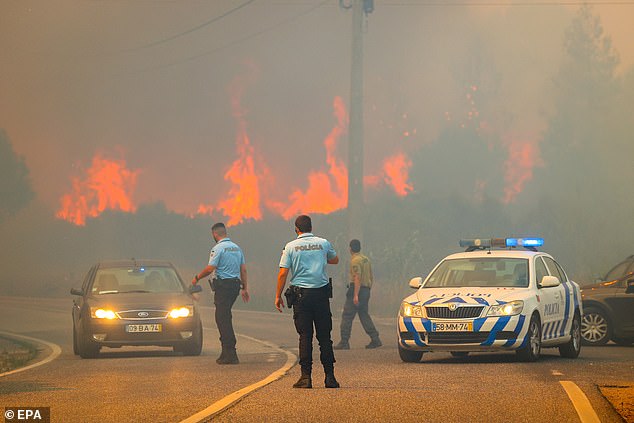
Police control traffic during a forest fire in Alcabideche, Cascais
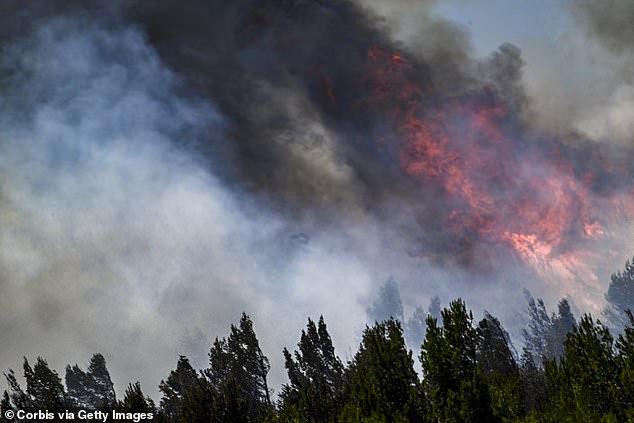
Dense smoke and large flames rise from a large wildfire on July 21, 2024 in Cascais, Portugal
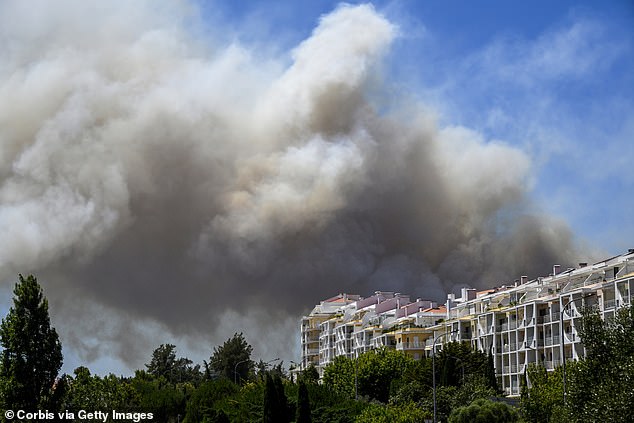
A large column of smoke rises above an apartment complex in Alcabideche, Portugal
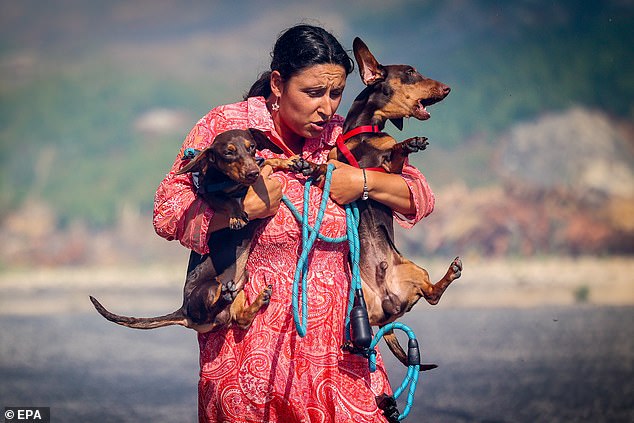
A woman saves animals during a forest fire in Alcabideche, Cascais
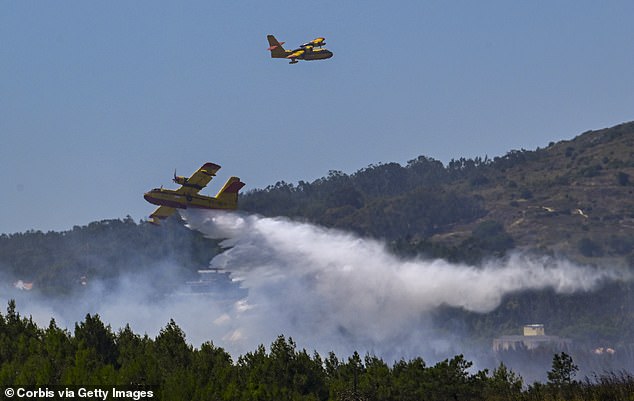
Two Canadair CL-215 (Scooper) amphibious firefighting aircraft fly over a dense cloud of smoke to drop water on a large forest fire in Portugal
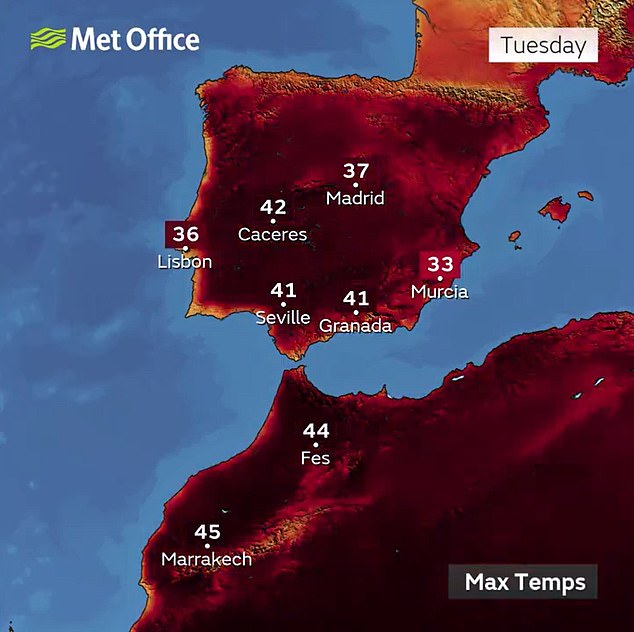
Temperatures exceed 40ºC this week in Spain, Portugal and Morocco
While the weather was expected to be less windy today, continued warm weather is unlikely to help firefighters.
Despite a video showing flames rising into the sky near residential buildings, local media said the only material damage caused by the fires was to a fire truck.
On Sunday, 14 people were reported injured, including 11 firefighters and three civilians.
Meanwhile, heat waves are giving way to brutal storms across large areas of northern Europe.
In France, more than 45,000 lightning strikes were recorded over the weekend, in what is believed to be the worst wave of storms of the year.
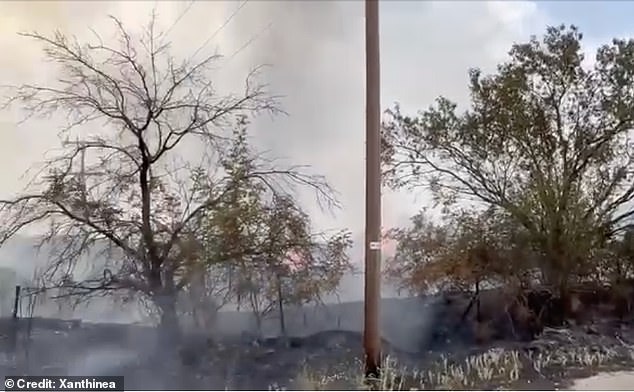
Wildfires continue to ravage parts of Greece amid sustained hot and dry conditions
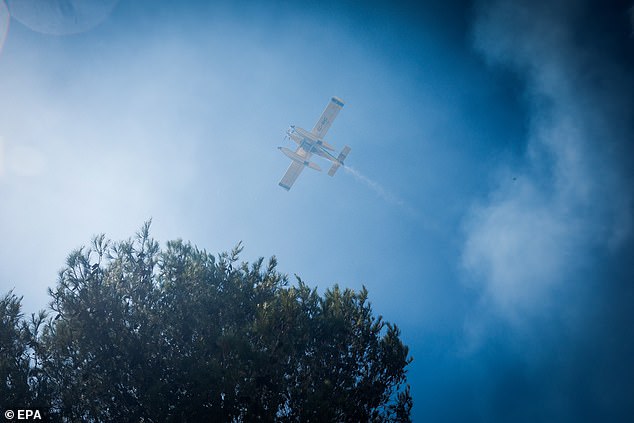
A plane fights a forest fire in Alcabideche, Cascais, as smoke rises
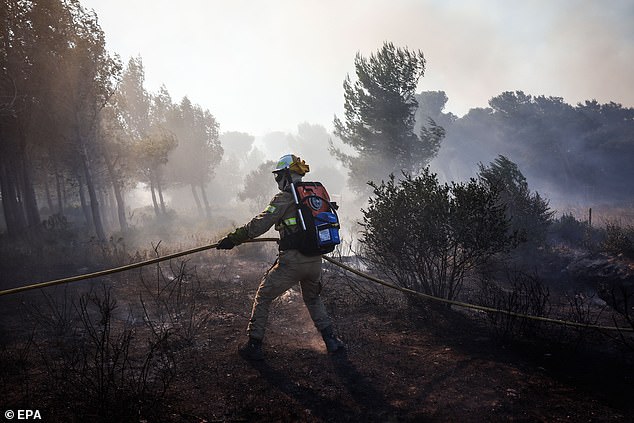
A firefighter battles a forest fire in Alcabideche. 14 people were injured in the blaze
An “intense stormy episode” that began on Saturday evening caused “significant” flooding in the northeastern region of Haute-Marne.
According to regional officials, five people were admitted to hospital after a strong storm, “mainly for hypothermia.”
Huge hailstones were filmed falling in areas along the south-east coast of France and on the island of Corsica last night, with locals and visitors warned to take care.
Flash floods also devastated parts of the country and people were evacuated from their homes in the early hours of Sunday morning as roads were blocked and power was cut off.

Flash flooding has hit parts of France in recent days amid storm warnings affecting the east of the country.
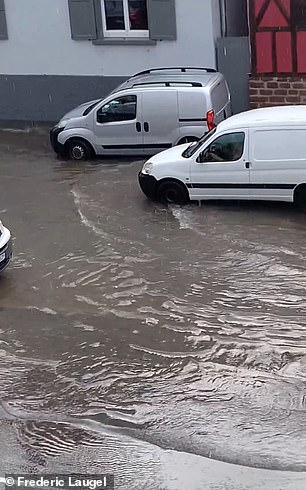
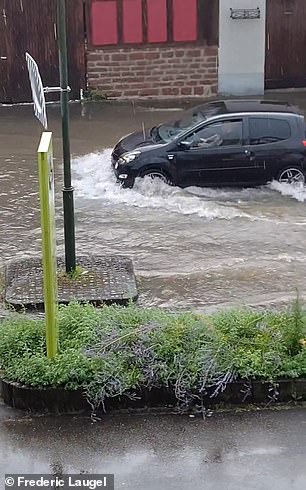
Motorists drive through floodwaters in France amid torrential rain
Similar scenes occurred yesterday in parts of eastern Holland, with dangerously high water levels blocking motorways and trapping people in their homes.
In a shocking video, only the roofs of several cars can be seen while the entire car park next to a block of flats is flooded.
The Austrian Alps were also hit by devastating flash floods yesterday, with rivers bursting their banks and streets turning into canals in what emergency services called “dramatic scenes.”
A state of emergency was declared in the town of Kremsbrücke in Carinthia and sirens could be heard on Sunday evening as houses were surrounded by water.
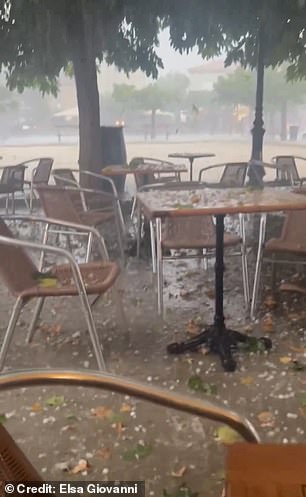
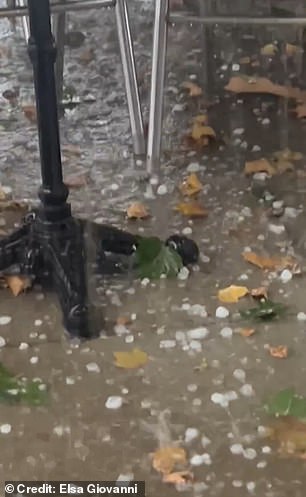
Huge hailstones were filmed falling along the south-east coast of France and on the island of Corsica last night (pictured)
Local residents were warned not to leave their homes and asked to move to higher floors to avoid rising waters.
“It is too dangerous to go near the stream or the river,” warned Josef Glanzer, commander of the Kremsbrücke fire brigade.
In a very short time, between 110 and 130 mm of precipitation fell in the area.
The water did not recede until around midnight and there were no reports of injuries, however the effects of the storm on residents were said to be “devastating”.

